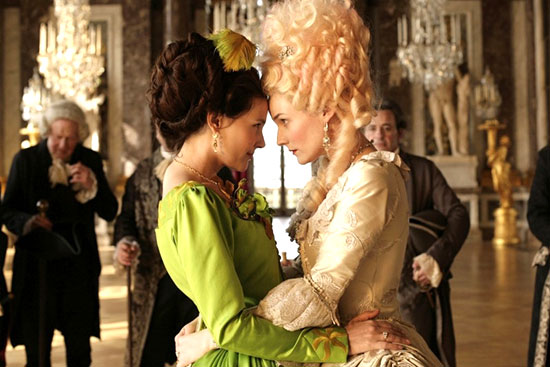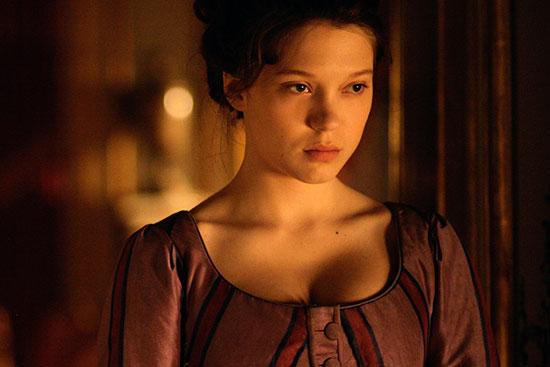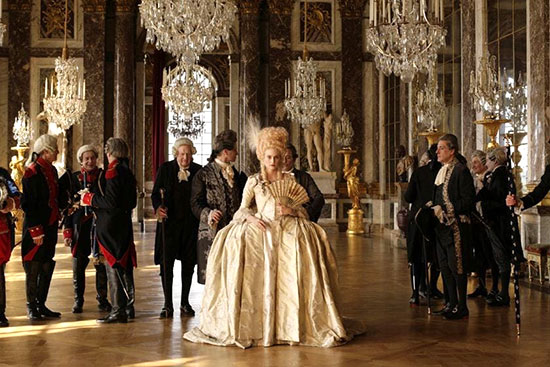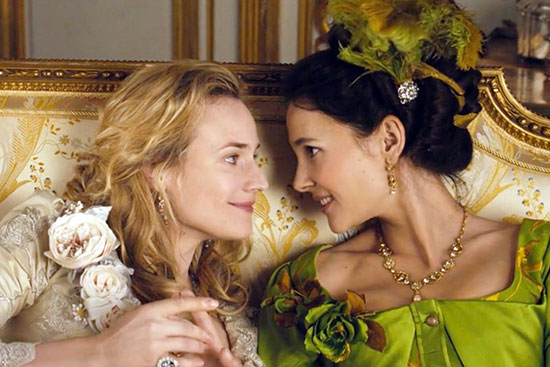Last Updated on March 10, 2022
Since her death at the guillotine in 1793, Marie-Antoinette has been one of the most written about historical figures of all time. On top of that, countless fiction novelists and filmmakers have sought to understand the motivations, desires, and inner life of the last Queen of France.

To help keep this site running: Willow and Thatch may receive a commission when you click on any of the links on our site and make a purchase after doing so.
Among the films delving into her life is “Farewell, My Queen.” Released in France in 2012, the lush costume drama offers a look at the ill-fated Marie-Antoinette through a fictionalized account of the early days of the French Revolution. It is an engrossing, masterfully-made historical drama that stays with the viewer long after the credits roll.
Andreina Romero and Gabriela Mörken-Romero, hosts of the podcast Wigs and Candles, review classic and more recent period films, focusing in particular on the way period dramas provide a lens to explore the past and the lives of women through different historical times. In the fourth of a series of articles for Willow and Thatch, they review “Farewell, My Queen” (2012).
On a hot summer morning. Sidonie Laborde (Léa Seydoux, Mysteries of Lisbon) wakes up and gets ready for work. Her job: to read the latest news, books, and plays to Marie-Antoinette, Queen of France. Her place of work: Versailles, located on the outskirts of Paris. It’s July 14, 1789, and an event is taking place just a few miles away that will soon throw the entire palace into disarray.

Based on the novel of the same name by preeminent French writer Chantal Thomas, “Farewell My Queen” (2012) tells the story of the terrifying fall of the Bastille and the start of the French Revolution.
Directed by veteran director Benoît Jacquot (Princesse Marie), the period drama offers a captivating look at the historical events from a deeply intimate and unusual perspective: that of a servant.
The story, from an adapted screenplay by Benoît Jacquot and Gilles Taurand, follows the fictional Sidonie during the first three days following the mobbing of the Bastille as she navigates her now perilous role as the reader for the queen (Diane Kruger, Copying Beethoven).

The result is an entrancing, gripping narrative that at times plays more like a suspense film than a historical one.
As any 18th-century subject living and working at Versailles would be, Sidonie is absolutely loyal to her queen. She’s smart, responsible, and proud of her position as Marie-Antoinette’s reader, a role that puts her in close proximity to the much-derided, decadent queen.
As the rumors of mobs taking over Paris start to make their way to the palace, Sidonie is a first-row witness to the changing moods of the queen, who becomes increasingly erratic as the reality of the crisis starts to bear out.
Throughout, Jacquot opts for a naturalistic sound design–the clacking of Sidonie’s shoes as she runs to the queen’s chambers often echoes across the halls of Versailles as does the wind blowing the midsummer treetops–and a sparse but suspenseful soundtrack.
The re-imagined events are grounded by relatable everyday realism, so much so that the viewer places herself in the palace. The French Revolution started in the middle of an oppressive, sticky summer, and throughout, Jacquot brings this to life: Sidonie has mosquito bites that she keeps scratching, and we empathize as she breathlessly runs back and forth in the queen’s service, her hair in disarray, sweat ruining her one and only work dress.
Add the sumptuous (if not entirely period-accurate) costumes by French designer Christian Gasc, the magnificent production design, and an incisive script that emphasizes the immediacy of the events, and you get a film that gives the viewer the uncanny feeling of witnessing history as it happens.
Throughout her reign, but especially after 1789, Marie-Antoinette was the victim of constant slander. Cartoons and pamphlets depicted the queen as a lesbian and claimed her favorites, such as the Duchesse of Polignac (Virginie Ledoyen, Les Misérables), were in fact her lovers.

In Marie-Antoinette: The Journey, biographer Antonia Fraser recognizes the emotional intensity of some of these friendships, but she also explains there is no evidence that Marie-Antoinette ever had a female lover.
While we see scenes of tenderness between Louis XVI and Marie Antoinette, “Farewell, My Queen” suggests that Marie-Antoinette’s deep affection for the Duchesse was an amorous infatuation, and much of the film’s intrigue revolves around a platonic love triangle: their romantic feelings for each other, and Sidonie’s obsessive admiration for the queen. This narrative, while fictional, keeps the viewer at the heart of events that reverberate with historical truth.
Léa Seydoux, with her large eyes and youthful expression, is unforgettable as the devoted but naive Sidonie. Diane Kruger is an elegant, frivolous, and capricious Marie-Antoinette. Put together, Seydoux and Kruger’s performance is spellbinding.
Playing more like a suspense movie than a costume drama, “Farewell, My Queen” is a feast for the eyes and the mind, a fascinating view inside Versailles as it confronts the imminent possibility of demise.
Listen to the full Wigs and Candles podcast episode on “Farewell, My Queen” here.
“Farewell, My Queen” (2012) is AVAILABLE to STREAM
Rated R for brief graphic nudity and language
Wigs and Candles, launched in 2021, is a podcast about two sisters and their obsession with period film. Andreina Romero is a freelance writer and researcher whose work focuses on the importance of the arts in life. She also reviews books, music, and films in local publications and her personal blog. Gabriela Mörken-Romero leads people in a multinational company with a passion for art history, historical fiction, and world museums. Originally from Venezuela, Andreina and Gabriela host their podcast from Canada and Germany respectively.
If you enjoyed this post, wander over to The Period Films List. You’ll especially like the Best Period Dramas: Georgian and Regency Era list. Also see our reviews of The Favourite, and Portrait of a Lady on Fire.

